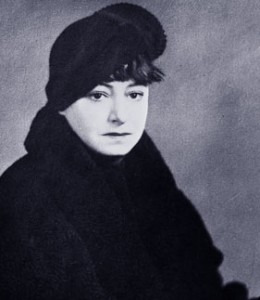 Famed for her caustic wit, Dorothy Parker was born in 1893 in New Jersey and was known from an early age for her uncompromising character. Her mother died when Parker was five and her father remarried a few years later. It was not a happy time for the future doyen of 20″s society. She refused to call this new woman either mother or step-mother, preferring instead to address her as the “housekeeper”.
Famed for her caustic wit, Dorothy Parker was born in 1893 in New Jersey and was known from an early age for her uncompromising character. Her mother died when Parker was five and her father remarried a few years later. It was not a happy time for the future doyen of 20″s society. She refused to call this new woman either mother or step-mother, preferring instead to address her as the “housekeeper”.
Despite having a Jewish father, she attended the Convent of the Blessed Sacrament before going to Miss Dana’s School where she graduated at the age of 18. Her father died shortly after and Parker made a living playing piano at a school for dance while writing poetry in her spare time. She sold her first poem to Vanity Fair in 1914 and then worked for Vogue as an editorial assistant.
In 1918 she stood in as theatre critic for P.G. Woodhouse, signifying a period when her career finally began to take off. She met and became friends with Robert Benchley and Robert Sherwood, forming the Algonquin Round Table that became a focus for Parkers extraordinary wit. Newspaper columnist Franklin Adams often printed her remarks and short verse in his weekly writings.
Parker was eventually fired by Vogue when her caustic remarks began to upset powerful theatre producers and she moved instead to the newly founded New Yorker where she become part of the board of editors. Her sharp wit and cutting verse were at their most potent over the next decade and a half and, during this time, she published well over 300 poems.
Despite her fame, she was never completely confident of her own ability and always wondered why people fussed over her poetry and witticisms. Her first book of poems, Enough Rope, was published in 1926 and was given good reviews and sold around 47,000 copies.
While she made friends with the likes of Hemingway and F. Scott Fitzgerald and was regarded as a wit and superb conversationalist, Parker also suffered from alcoholism and was plagued by thoughts of suicide throughout a large part of her life, something which often came across in poems such as The Small Hours:

In the 1930s Parker turned more towards short fiction. She married writer Alan Campbell and moved to Los Angeles where they became a successful screenwriting team, producing work which led to an Academy Award nomination for the film A Star is Born in 1937.
A socialist to the core, Parker was called before the House of Un-American Activities in 1955 where she pleaded the 5th Amendment. There was reputed to be a 1,000 page dossier on her by the FBI and she was blacklisted and unable to work in Hollywood anymore.
Her poetry veers from the playful to the darkly serious, perhaps a reflection of her continuous battle with both her own personality and the world around her. She had a tempestuous marriage to Campbell that ended in divorce and their remarriage a few years later. At her height, her humorous verse reflected the 20s as a lively and carefree decade whilst her more sombre work suggested an underlying darkness to society.

After the death of her husband, Parker returned to New York and did occasional work for the radio. She died of a heart attack at the age of 73 in 1967, leaving her estate to Dr Martin Luther King.

